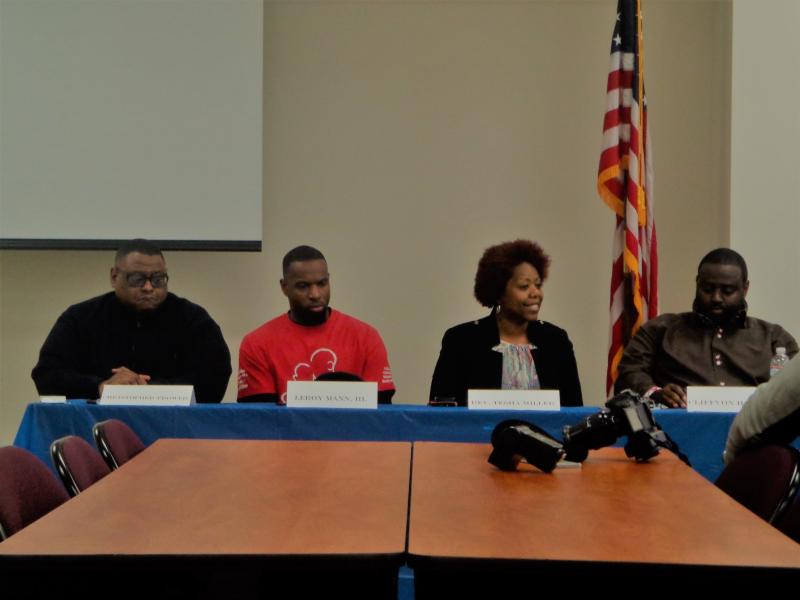A town hall forum in Georgetown Feb. 24 connected educators, clergy and local leaders with community members for the first workshop in a series designed to help Sussex County's African-American youth succeed.
The Save Our Sons forum drew a packed house at First State Community Action Agency, where participants discussed obstacles African-American children face and ways to pool resources that strengthen civic and family involvement in under-served communities.
"It's critically important we get into our children's lives. If not, we're losing them to gun violence. We're talking about the school drop-out rate for our young men and women. We're talking about a lot of issues we typically wait for others to solve. We're it. We have enough brain power in this room right now if we all do our part," said panelist Lorenzo Hopkins.
Hopkins and fellow panelist Cliffvon Howell, Cape grads and current radio co-hosts, now live outside the Cape Region but developed the idea for the Sussex County-based forum after callers targeted issues on their blog radio program The Brown-Eyed Perspective. Listeners pointed to the school-to-prison pipeline, educational barriers, mentoring in an era of absentee fathers and problems young adults have re-entering society after prison.
"Sussex County is home to me, whether I live here or not. This gives me the opportunity to be impactful in the area that gave me my start," Howell said.
"We're trying to start a movement not just for today," Hopkins added. "We want to give back to the community that created us. We're the older statesman now, and it's our legacy."
Cape alumni the Rev. Tesha Miller of Seaford Macedonia AME Church, youth mentor Daniel Paskins Jr. and nephrologist Juan Saez, M.D., echoed that wish to serve their community on the panel. They were joined by parent Christopher Trower, Delaware Fatherhood & Family Coalition Sussex County President Leroy Mann III, DFFC Kent County President Keenon Mann and moderator Dara Laws Savage, instructor at Delaware State University's Early College High School.
Because African-American high schoolers are suspended five times more often than whites, it's imperative to see how school discipline, law enforcement and the criminal justice system interact to cause the school-to-prison pipeline, Howell said.
"In the adult prison system in Delaware, African-Americans outnumber whites 6:1. We have to take that 20,000-foot view to see how this happens in steps."
Delaware police contact young African-American men 10 times more than whites, Howell added. The arrest rate for African-American men is nearly eight times greater and the detention rate 10 times greater.
"It's my job to take a look at services we need to provide to young people, services to keep young people out of the system and services we provide to young people who unfortunately have found their way into the system," he said.
Knowing literacy rates can help avoid the school-to-prison pipeline.
"Statistics are clear: If your kid is behind reading level at a certain age, they can get to the point where they hate school, get frustrated, then you have a problem making them go to school and they end up dropping out," Hopkins said. "The worst thing is to have your kid out there with limited education - eventually trouble is going to find him."
Participants discussed how literacy programs through church and community groups can provide consistency for at-risk teens, while discipline and structure must start at home.
"Programs are available to help our kids. There's no such thing as a bad kid, just a bad situation. The effort and time you put into your kid is worth it, and if you don't put your time into it, a gang will. As parents, we have to do more," Trower said.
Panelists and audience members shared stories of childhood anger without a father in the home.
"We're talking elementary kids to grown men. We hear that anger. In kids, it comes with acting out. So what I would encourage everyone to do is if you see someone acting out, just sit him down and talk to him. Engage with him," Hopkins said.
Following the forum, participants networked to form relationships needed to create a community-based coalition ready to tackle the concerns expressed.
"This was a good start," said First State Director Bernice Edwards of Milton. "We can't come to the table with our problems if we have no solutions. To save our community, we have to be actively involved also."
Organizers will hold a follow-up workshop within the next couple months. Call Hopkins at 302-632-6752 or email northstarcllc@gmail.com for details.
















































